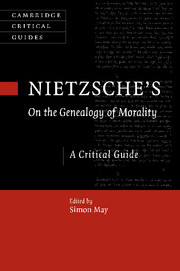Book contents
- Frontmatter
- Contents
- Contributors
- Acknowledgements
- Note on texts, translations, and references
- Introduction
- Chapter 1 The future of evil
- Chapter 2 On the nobility of Nietzsche’s priests
- Chapter 3 The genealogy of guilt
- Chapter 4 Why Nietzsche is still in the morality game
- Chapter 5 Who is the “sovereign individual”? Nietzsche on freedom
- Chapter 6 Ressentiment and morality
- Chapter 7 The role of life in the Genealogy
- Chapter 8 The relevance of history for moral philosophy
- Chapter 9 Why would master morality surrender its power?
- Chapter 10 “Genealogy” and the Genealogy
- Chapter 11 The promising animal
- Chapter 12 Nietzsche and the “aesthetics of character”
- Chapter 13 Nietzsche and the virtues of mature egoism
- Chapter 14 Une promesse de bonheur? Beauty in the Genealogy
- Bibliography
- Index
Chapter 8 - The relevance of history for moral philosophy
a study of Nietzsche’s Genealogy
Published online by Cambridge University Press: 05 November 2011
- Frontmatter
- Contents
- Contributors
- Acknowledgements
- Note on texts, translations, and references
- Introduction
- Chapter 1 The future of evil
- Chapter 2 On the nobility of Nietzsche’s priests
- Chapter 3 The genealogy of guilt
- Chapter 4 Why Nietzsche is still in the morality game
- Chapter 5 Who is the “sovereign individual”? Nietzsche on freedom
- Chapter 6 Ressentiment and morality
- Chapter 7 The role of life in the Genealogy
- Chapter 8 The relevance of history for moral philosophy
- Chapter 9 Why would master morality surrender its power?
- Chapter 10 “Genealogy” and the Genealogy
- Chapter 11 The promising animal
- Chapter 12 Nietzsche and the “aesthetics of character”
- Chapter 13 Nietzsche and the virtues of mature egoism
- Chapter 14 Une promesse de bonheur? Beauty in the Genealogy
- Bibliography
- Index
Summary
The fact is that conversions are difficult because the world reflects back upon us a choice which is confirmed through this world which it has fashioned.
Simone de Beauvoir, The Ethics of Ambiguity (1976)Nietzsche’s On the Genealogy of Morality occupies an unstable position in philosophical thought: it oscillates between seeming damning and irrelevant. The text’s central argument is that our most cherished evaluative beliefs have a revolting history: our moral beliefs are the product of a ressentiment-inspired revolt carried out by a lackluster, vengeful underclass approximately two thousand years ago. But what is the import of this conclusion? On the one hand, the reader is tempted to agree with Charles Taylor, who writes, “no one can fail to recognize that, if true, Nietzsche’s genealogies are devastating” (Taylor 1989: 72). On the other, one soon finds oneself wondering why, exactly, a recounting of events that took place two millennia ago should have any bearing on one’s acceptance of modern morality. One finds oneself torn between wanting to insist that the history of our moral evaluations must be relevant, while at the same time failing to see how the history could so much as aspire to relevance.
These reactions are heightened by Nietzsche’s own seemingly ambivalent stance toward history’s relevance for moral philosophy. Nietzsche tells us that the Genealogy comprises “three crucial preparatory works for a revaluation of all values,” thereby suggesting that the Genealogy constitutes a critique of morality (EH, “The Genealogy of Morality”). Yet he also insists that “the inquiry into the origin of our evaluations and tables of the good is in absolutely no way identical with a critique of them, as is so often believed,” thereby seeming to reject the idea that the Genealogy could serve a critical function (WP, 254).
- Type
- Chapter
- Information
- Nietzsche's On the Genealogy of MoralityA Critical Guide, pp. 170 - 192Publisher: Cambridge University PressPrint publication year: 2011
- 7
- Cited by

